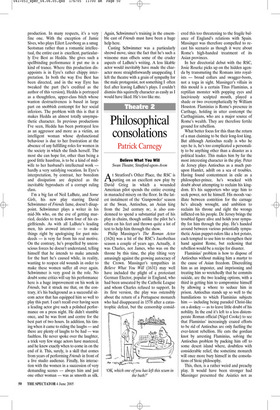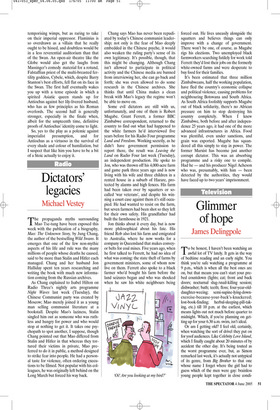Philosophical consolations
Patrick Carnegy
Believe What You Will Swan Theatre, Stratford-upon-Avon At Stratford’s Other Place, the RSC is putting on an excellent new play by David Grieg in which a wounded American pilot spends the entire evening in manacled misery on the floor. In the latest instalment of the ‘Gunpowder’ season at the Swan, Antiochus, an Asian king from the 2nd century BC, is also condemned to spend a substantial part of his play in chains, though unlike the pilot he’s often on his feet and thrown quite a lot of text to help him through the show.
Philip Massinger’s The Roman Actor (1626) was a hit of the RSC’s Jacobethan season a couple of years ago. Actually, it was Charles, not James, who was on the throne by this time, the play tilting very amusingly against the growing autocracy of the Crown. Massinger’s sympathies in Believe What You Will (1631) may well have included the plight of a protestant German Elector, popular in England, who had been unseated by the Catholic League and whom Charles refused to support. In its first version, the play was ostensibly about the return of a Portuguese monarch who had disappeared in 1578 after a catastrophic defeat, but the censorship consid ered this too threatening to the fragile balance of England’s relations with Spain. Massinger was therefore compelled to recast his scenario as though it were about Rome’s high-handed treatment of its Asian provinces.
In her directorial debut with the RSC, Josie Rourke picks up on the hidden agenda by transmuting the Romans into royalists — broad collars and swagger-boots, not a toga in sight. Massinger’s villain in this mould is a certain Titus Flaminius, a reptilian monster with popping eyes and lasciviously sculpted mouth, played a shade or two overemphatically by William Houston. Flaminius is Rome’s presence in Carthage, holding in utter contempt the Carthaginians, who are a major source of Rome’s wealth. They are therefore fertile ground for rebellion.
What better focus for this than the return of a man claiming to be their long-lost king. But although Antiochus really is who he says he is, he’s too complicated a personality to be anything other than a disaster as a political leader. This makes him by far the most interesting character in the play. Peter de Jersey plays Antiochus as a much putupon Hamlet, adrift on a sea of troubles. Having found contentment in exile as a philosopher-prince, he’s wracked with doubt about attempting to reclaim his kingdom. It’s his supporters who urge him to seek power, not he himself. His moods vacillate between contrition for the carnage he’s already wrought, and ambition to reclaim his throne and right the wrongs inflicted on his people. De Jersey brings the troubled figure alive and holds your sympathy for him through the play. He’s handed around between various potentially sympathetic Asian puppet-rulers like a hot potato, each tempted to use him to strengthen their hand against Rome, but reckoning that rebellion would be a recipe for disaster.
Flaminius’ problem is how to dispose of Antiochus without making him a martyr to the cause of Asian freedom. Discrediting him as an imposter, and imprisoning and treating him so wretchedly that he commits suicide, are the two leading options, with a third in getting him to compromise himself by allowing a whore to seduce him in prison. Antiochus stands up so well to the humiliations to which Flaminius subjects him — including being paraded Christ-like on a donkey — as to leave little doubt of his nobility. In the end it’s left to a less distemperate Roman official (Nigel Cooke) to see that Flaminius’ increasingly crazed efforts to be rid of Antiochus are only fuelling the ever-latent rebellion. He cuts the gordian knot by arresting Flaminius, solving the Antiochus problem by packing him off to some desert island where, doubtless with considerable relief, the sometime monarch will once more bury himself in the consolations of Stoic philosophy.
This, then, is a rather weird and preachy play. It would have been stronger had Massinger presented the Asiatics not as temporising wimps, but as raring to take on their imperial oppressor. Flaminius is so overdrawn as a villain that he really ought to be hissed, and doubtless would be in a less reverential auditorium than that of the Swan. An open-air theatre like the Globe would also get the laughs from Massinger’s comedy material for a rotund, Falstaffian priest of the multi-breasted fertility goddess, Cybele, which, despite Barry Stanton’s best efforts, fell flat on its face in the Swan. The first half eventually wakes you up with a tense episode in which a spirited Asiatic queen stands up for Antiochus against her lily-livered husband, who has as few principles as his Roman overlords. The second half is generally stronger, especially in the finale when, albeit for the umpteenth time, definitive proofs of Antiochus’ identity come to light.
So, yes to the play as a polemic against imperialist presumption, and for Antiochus as a virtuoso in the survival of every shade and colour of humiliation, but I suspect that like him you have to be a bit of a Stoic actually to enjoy it.



















































 Previous page
Previous page